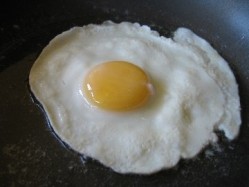Nutritionist challenges egg-busting study

The research, which examined data on more than 1,200 patients attending vascular prevention clinics, was spearheaded by Dr David Spence, professor of neurology at Western University, Canada.
Spence’s findings linked egg yolk consumption to the build up of carotid plaque, leading to coronary artery disease – or atherosclerosis - a risk factor for strokes and heart attacks. He found regular consumption of egg yolks appeared to be two thirds as bad as smoking when it comes to the disease by comparing data on egg consumption with data on smoking.
Ruxton told FoodNavigator: “What they are not thinking about is, is it a causal or unrelated association? They haven’t corrected for other factors that could have created plaque. The person who has fried eggs for breakfast may also have butter on their toast [for example].”
Other factors to consider included sedentary behaviour, which the researchers had also appeared not to allow for, she said.
Peer reviewed
However, Spence’s research was published in the peer-reviewed journal Atherosclerosis. And Spence adds that the effect of egg yolk consumption over time on increasing the amount of plaque in the arteries was independent of sex, cholesterol, blood pressure , smoking, body mass and diabetes.
The study also concludes: “Our findings suggest that regular consumption of egg yolk should be avoided by persons at risk of cardiovascular disease. This hypothesis should be tested in a prospective study with more detailed information about diet, and other possible confounders such as exercise and waist circumference.”
The research relied heavily on epidemiology, said Ruxton, but more work was needed to establish a causal link. “One thing I was taught on when I was training as a dietician was never rely on epidemiology. You have to test a theory with a controlled trial.”
Carotid plaques
The rupture of carotid plaques, which form on the inner arterial wall, is the commonest cause of heart attacks and strokes. The build up of such plaques in the arteries of participants in the study was measured by ultrasound and patients filled out questionnaires regarding their lifestyle and medications.
They indicated their pack-years of smoking (how many packs of cigarettes they smoked daily multiplied by how many years they had spent smoking). And they supplied their egg yolk-years (how many eggs they ate a week, multiplied by the number of years they had eaten eggs).
The research found carotid plaque area increased linearly with age after age 40, but exponentially with pack-years of smoking and egg yolk-years. The study also found that those eating three or more yolks a week had significantly more plaque area than those who ate two or fewer yolks a week.
'Egg yolks make plaque build up faster'
“What we have shown is that with ageing, plaque builds up gradually in the arteries of Canadians, and egg yolks make it build up faster – about two thirds as much as smoking,” said Spence.
The Harvard School of Public Health comments on its website: “While it's true that egg yolks have a lot of cholesterol—and so may weakly affect blood cholesterol levels—eggs also contain nutrients that may help lower the risk for heart disease, including protein, vitamins B12 and D, riboflavin, and folate.
It adds that substantial research also suggests cholesterol in food has a much smaller effect on blood levels of total and ‘bad’ (LDL) cholesterol than the mix of fats in the diet.



















